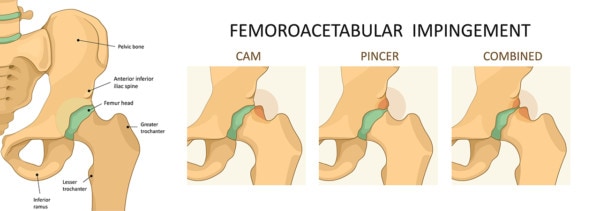If You Have Any Arthritis Hip FAI Surgery Is a Bad Idea

Logika600/Shutterstock
The number of hip FAI surgeries has exploded in recent years. However, there has been a consistent finding in the research that shows that anyone with any type of hip arthritis is not a candidate for this surgery. A big super study on the topic was just published. Let’s dig in on what it told us.
Hip FAI Surgery
FAI stands for a hip condition called Femoroacetabular Impingement. The idea is that the hip joint is not the correct shape and is therefore causing impingement. That means that parts of the ball or socket or both are hitting into the joint. The two most common types of FAI are:
The basic concept is that a surgeon needs to remove the pincer or cam parts of the bone as this is resulting in trauma to the hip labrum and joint. An impingement diagnosis often leads to a labral repair or a bone removal procedure with the number of these invasive surgical procedures exploding year over year (1).
Is FAI Part of the Normal Aging Process?
What if FAI were present in people who didn’t have hip pain? That would change the calculus right? Meaning we could no longer rely on MRI reports of FAI as a way to decide who should get the surgery and who shouldn’t.
Here are some research results on people who have no hip pain, but underwent hip x-rays or MRIs:
- A study out of Norway looked at 2,081 young adults with no hip pain (2). They found that more than half had at least one measurement that met the diagnosis of hip FAI. Many other common FAI radiographic signs were present in about 1/4 of the participants.
- A research study out of the US again showed that about a quarter of the hips of people without hip pain had an FAI diagnosis based on MRI (3).
- A Spanish study looked at 1,878 asymptomatic hips and found that the prevalence of Cam impingement was 30% and that Pincer impingement was present in 24% of the individuals (4).
Hence, right here the FAI story falls apart a bit if we’re operating on people to correct findings that often don’t cause pain.
FAI Surgery and Arthritis
One of the things that has been popping up in the research for a while is that people with hip arthritis have poor outcomes from impingement surgery. A brand new study analyzed seven studies with a total of 1,129 total patients (5). The failure rate of FAI surgery was more than 8 times higher when the patient had any indication of arthritis. In addition, the percentage of people who needed a hip replacement was significantly higher in the FAI group with arthritis (37.3%) than in the group without arthritis (9.7%).
The upshot? It’s official now, we really shouldn’t be performing hip FAI surgery in people with hip arthritis. We also may need to reexamine why we’re doing any of these procedures in the first place.
_____________________________________________
References:
(1) Westermann RW, Day MA, Duchman KR, Glass NA, Lynch TS, Rosneck JT. Trends in Hip Arthroscopic Labral Repair: An American Board of Orthopaedic Surgery Database Study. Arthroscopy. 2019 May;35(5):1413-1419. doi: 10.1016/j.arthro.2018.11.016. Epub 2019 Apr 9. PMID: 30979629.
(2) Laborie LB, Lehmann TG, Engesæter IØ, Eastwood DM, Engesæter LB, Rosendahl K. Prevalence of radiographic findings thought to be associated with femoroacetabular impingement in a population-based cohort of 2081 healthy young adults. Radiology. 2011 Aug;260(2):494-502. doi: 10.1148/radiol.11102354. Epub 2011 May 25. PMID: 21613440.
(3) Jung KA, Restrepo C, Hellman M, AbdelSalam H, Morrison W, Parvizi J. The prevalence of cam-type femoroacetabular deformity in asymptomatic adults. J Bone Joint Surg Br. 2011 Oct;93(10):1303-7. doi: 10.1302/0301-620X.93B10.26433. Erratum in: J Bone Joint Surg Br. 2011 Dec;93(12):1679. PMID: 21969426.
(4) Morales-Avalos R, Tapia-Náñez A, Simental-Mendía M, et al. Prevalence of Morphological Variations Associated With Femoroacetabular Impingement According to Age and Sex: A Study of 1878 Asymptomatic Hips in Nonprofessional Athletes. Orthopaedic Journal of Sports Medicine. February 2021. doi:10.1177/2325967120977892
(5) Lei P, Conaway WK, Martin SD. Outcome of Surgical Treatment of Hip Femoroacetabular Impingement Patients with Radiographic Osteoarthritis: A Meta-analysis of Prospective Studies. J Am Acad Orthop Surg. 2019 Jan 15;27(2):e70-e76. doi: 10.5435/JAAOS-D-17-00380. PMID: 30256340.
If you have questions or comments about this blog post, please email us at [email protected]
NOTE: This blog post provides general information to help the reader better understand regenerative medicine, musculoskeletal health, and related subjects. All content provided in this blog, website, or any linked materials, including text, graphics, images, patient profiles, outcomes, and information, are not intended and should not be considered or used as a substitute for medical advice, diagnosis, or treatment. Please always consult with a professional and certified healthcare provider to discuss if a treatment is right for you.